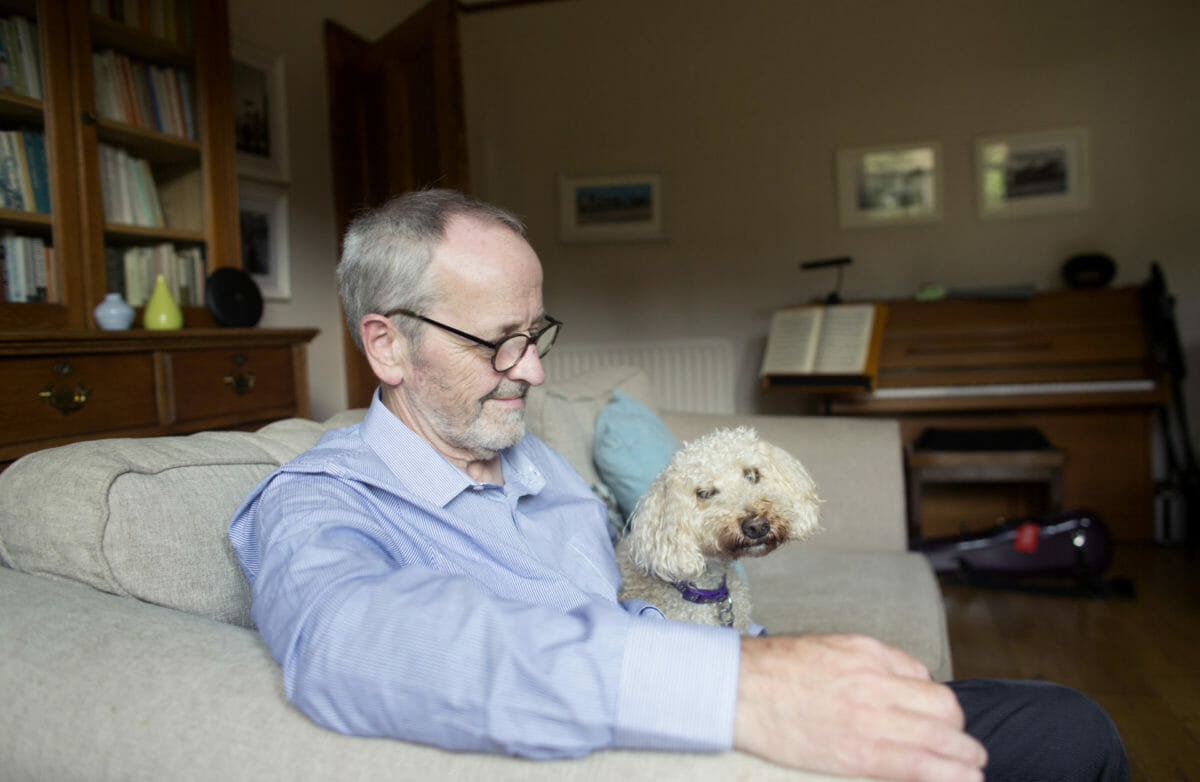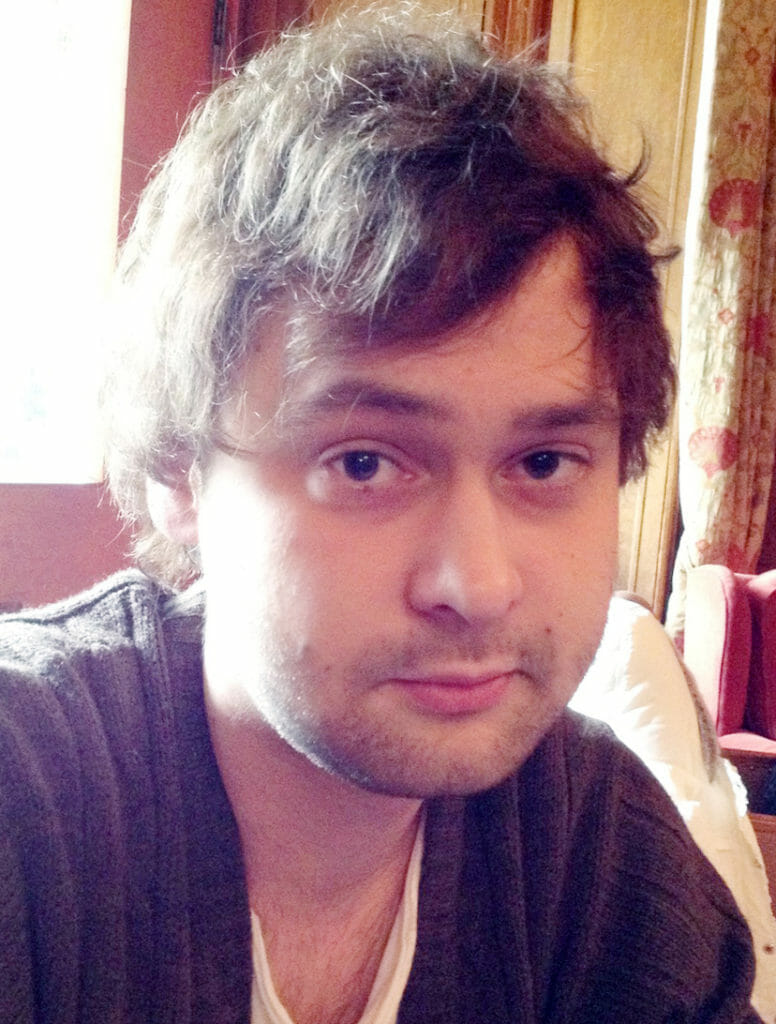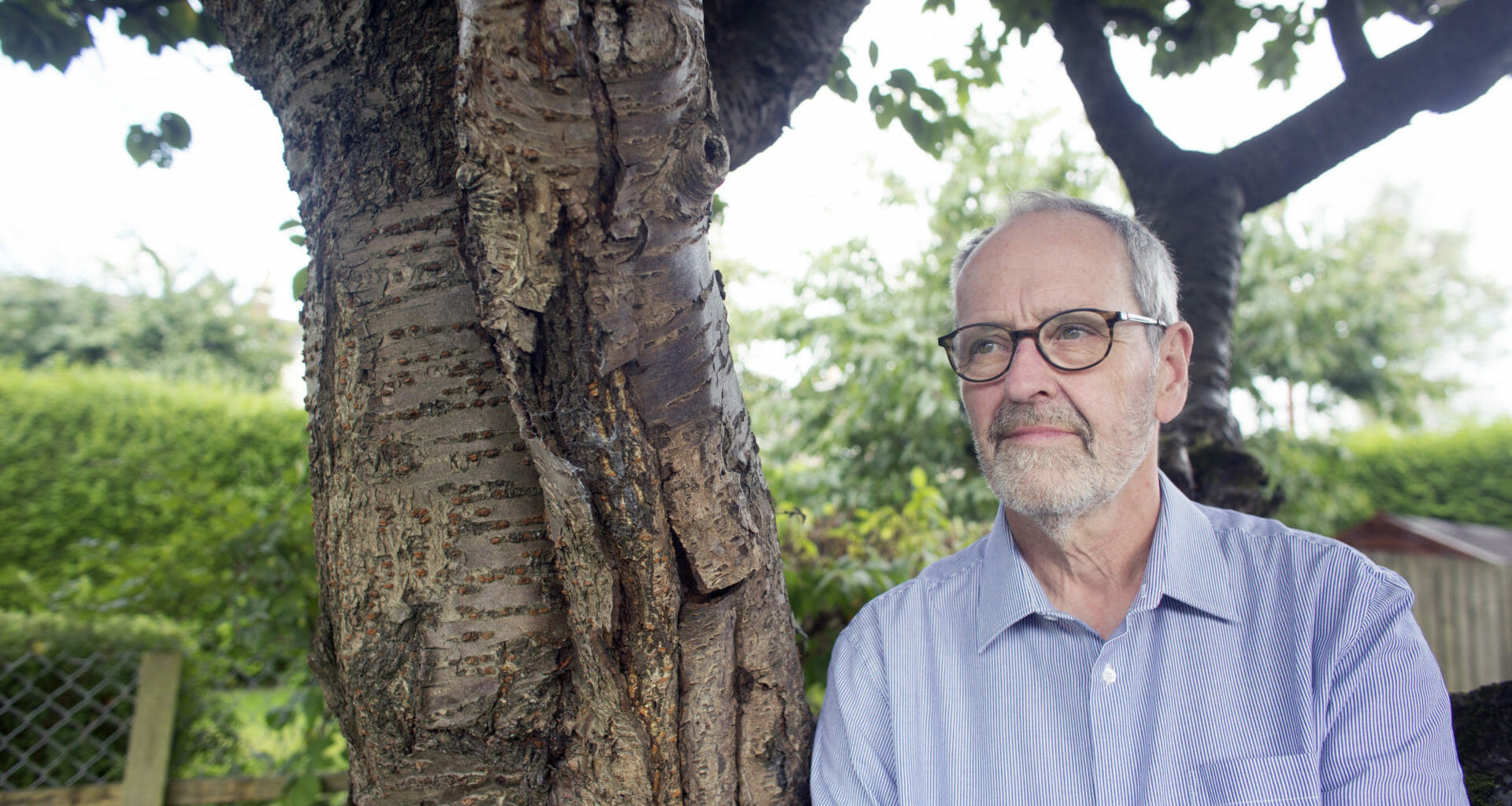In Fred Parry’s back garden is a cherry tree. Its solid trunk and wide low branches are great for climbing – his son Adam used to clamber on it with the neighbourhood kids and his wee brother.
From late June to the end of July it hangs heavy with ripe, red fruit, a feast for the birds. In autumn the leaves fall and in spring the soft new ones unfurl. In May the garden is filled with its fragrant pink and white blossom – the wind scatters it across the grass like confetti.
This year, May was also the month that Adam – handsome, charming and fiercely bright, says his father – died at just 32. He’d struggled with alcohol addiction for 13 years, and, his family believe, did not get the treatment and support he needed. “Quite honestly, the help wasn’t there,” says Parry.
He puts a hand on the tree as he squints into the sunshine before we turn back indoors. We are meeting at Parry’s Glasgow home shortly after National Records of Scotland statistics revealed the highest number of alcohol-specific deaths registered in Scotland since 2008, the year Adam’s drinking started. 1,190 people died in 2020 as a direct consequence of alcohol misuse, 70 more than the previous year.
For Parry, the numbers spoke clearly to the lack of treatment available. “The figures for drug deaths came out just months before these ones,” he says as we sit at the table in the backroom of his terraced house. “They were seen as a national scandal, with the First Minister admitting she had taken her eye off the ball. When these figures came out there was hardly anything said.
“There’s a mismatch in all of this to me. Addiction is addiction, no matter what it is. The big question that it feels like no-one is asking is: where is the treatment?”

It’s a question that also preoccupies Suzanne Gallagher, who oversees the helpline at Scottish Families Affected by Alcohol and Drugs (SFAAD). Over the last 18 months, while Gallagher and helpline advisors continued to fulfil their core mission of supporting families, they also found themselves fielding hundreds of calls from those struggling with addiction and left with nowhere to turn.
An internal report produced by the charity this month details 375 messages from people who use drugs or alcohol who reported having difficulty contacting treatment services or accessing support, or who struggled with the low level of help offered. All the calls were about statutory services, the report notes.
“Through lockdown a lot of services closed their doors completely,” says Gallagher. Most were only available initally by phone, but phone numbers were often centralised and different to numbers publicly available. “We’re 18 months in and some of those services have still not updated contact details on their websites,”she adds.
One of the biggest issues was that people didn’t have credit on their mobile phone so they would phone our helpline because it was free. We would then pass on their contact to the treatment service and ask them to follow-up. But that could take a week and a half. Sometimes they just wouldn’t call back.
Suzanne Gallagher, Scottish Families Affected by Alcohol and Drugs (SFAAD)
“One of the biggest issues was that people didn’t have credit on their mobile phone so they would phone our helpline because it was free. We would then pass on their contact to the treatment service and ask them to follow-up. But that could take a week and a half. Sometimes they just wouldn’t call back.” No text, email or web chat options, offered by charities, are available.
“A lot of people were told they would be waiting three weeks and they would phone us to say they couldn’t wait three weeks. That’s a huge thing for our advisors to listen to. These are people who have the feeling that nobody cares. And meanwhile it’s the third sector services that are carrying the can. We’ve raised it with the Scottish Government but nothing has been done. There is no accountability.”
But this, she agrees, is not just an issue about lockdown, which has merely exacerbated existing problems with accessing treatment. Much of Scotland’s focus has been on the shortcomings of drug treatment services and the shortage of rehab, despite an additional £18million allocated in May by the Scottish Government. But many claim the same issues exist with the lack of investment in alcohol addiction treatment.
Parry believes it is essential that those concerns are also raised. He encountered difficulties in helping his son from the off. Adam’s drinking started when he went to St Andrew’s University to study chemistry. He failed his end of year exams and had to come home, and although he got a place at Glasgow University the following year, he only lasted a term.
“He wasn’t in control of his addiction at that point,” says Parry. “He would stop every now and again. But when he drank, he drank. And it just continued.” In 2012 he had a seizure when withdrawing, bringing him into contact with the Community Addiction Team (CAT).

“His very first appointment with CAT – and this immediately rang alarm bells – was for a date that had already passed,” remembers Parry.
They attended the drop-in instead but were told it would still take three weeks for assessment. “Adam was shaking because he was withdrawing at that point,” remembers Parry. I asked about going into rehab and was told: “No, that wouldn’t happen.”
“By that point myself and my wife were panicking, seeing the life of this very clever young man just going down the tubes.” They had been left some inheritance money and agreed with Adam to fund private residential drug and alcohol rehabilitation clinic Castle Craig.
It cost over £15,000 for six weeks but he was admitted within two days. Though health services from other countries like the Netherlands fund places for Castle Craig most Scottish health boards do not. Adam, says his father, was one of only a few Scottish people there at the time.
“On the way there I got a phone call from CAT demanding to know why I was taking him there and who was paying for it. But I thought the treatment and the things that they dealt with were really good. He came out a renewed person.”
Two and a half years of sobriety followed, when Adam – who loved learning and still wanted to go to university – did access courses but never took up places offered, revealing, says his father, that there were also mental health issues. These, he says, were never professionally assessed. “When I asked about it I was told he seemed articulate, there doesn’t seem to be any issue,” says Parry. “But alcoholics are masters of disguise.”
Eventually the pull of alcohol became too strong again for Adam. “I tried to encourage him to go to Alcoholics Anonymous (AA) and get back in touch with CAT,” says Parry. He can’t know for sure if he tried.
Meanwhile Adam split up with his girlfriend and moved back home with his parents and younger sister and he continued to drink. At night his father stayed awake until he was home, or prowled the streets looking for him if he didn’t return.

In August 2019 he was found by members of the public at 3am after a fall and taken to hospital with a brain bleed, where he spent three weeks in a neurology unit due to difficulty with his memory and walking. He went through detox, was sent home with medicine to control the seizures but without follow-up from addiction services. Within five weeks he was drinking again.
By the following September there was another seizure and hospitalisation Parry was told the addiction team had seen him and that CAT would be in touch. The drinking restarted after a fortnight this time. In October the same thing happened, and in January, February and March.
“There was medication,” says Parry. “Acamprosate to address cravings, anti-depressants by this time and he was still supposedly taking Kepra . But there was no supervision or anyone checking up on him. When Adam started drinking he stopped taking the medication. And there was no plan for his recovery.
The Community Addiction team phoned me three days after Adam died. They said: “Sorry to hear about your son. Condolences.” I couldn’t carry on the conversation. I just put the phone down.
Fred Parry, Adam’s father
“He was very unhappy by now, desperate to get help. I would get texts.” Parry struggles with emotion as he scrolls through them. “I feel close to death” writes Adam in one. He is, he says, desperate to stop, desperately unhappy. “I remembered that text about two days after he died and it just destroyed me,” says Parry.
And he pauses before saying: “Because, you see, I’m a recovered alcoholic. It’s been 20 years of sobriety so I knew that recovery was possible. But before that, I was in hospital for ten weeks with acute pancreatitis. And at the time even that didn’t stop me drinking. So when people say it’s a choice, they have no idea. They have no idea of the mental torture of addiction.”
Detox wasn’t enough for Adam, he says. Long term rehab of six months to a year, with structure, housing, follow-up, was what was needed. But that wasn’t made available. There should, Parry claims, have been a treatment plan for his son’s alcoholism like there was when his wife got cancer. “It’s an illness too,” he says.
But in May there was a final seizure. “I heard him fall against the door,” says Parry, “and I couldn’t push it open.” The fire brigade had to be called as well as an ambulance, so the crew could get access, but it was too late.
“CAT phoned me three days after Adam died. It was, maybe ten years since I’d heard from them? They said: “Sorry to hear about your son. Our condolences. Anything we can do to help?” I couldn’t carry on the conversation. I just put the phone down.”

Later he called back. “But I haven’t had any answers,” he says. “What is happening now is a Significant Adverse Event Review – I have a leaflet.” He has tried to call the number on the back repeatedly to find out how he can be involved but it just rings out.
To Alison Douglas, chief executive of Alcohol Focus Scotland, the increase in alcohol-specific deaths in 2020, underlines “the urgent need to do better for people with alcohol problems”.
“Alcohol treatment services and recovery support were insufficient to meet the need prior to the pandemic and we know that many people – particularly heavier drinkers – have been drinking more during the last 18 months,” she says.
“Currently only a small proportion of people who need support are in receipt of services and this needs to change. Family members can also be profoundly affected by a loved one’s alcohol problem and are entitled to support in their own right.
“Planning and investment in alcohol treatment and support should consider the whole family.” The recent and “significant” investment in drug treatment needs to be matched with investment in “recovery-oriented alcohol services”, she adds.
Meanwhile Parry is left with his questions. Did Adam have a key worker when he died? Did the hospital addiction team act on Parry’s request for a referral to a specialist unit? Was rehab discussed with Adam? What about referral to a psychiatrist? Was he flagged as vulnerable on the system?
In response to these questions and others, a spokesperson for NHS Greater Glasgow and Clyde said: “We are aware of the sad death of Mr Parry and, though we cannot comment on the individual circumstances of this case, we are sorry that his father feels the care his son received was not up to the standards he would have expected.
“NHSGGC’s Alcohol and Drug Recovery Services, like all community health and care services, have been impacted by Covid. At times it has been necessary to restrict contact with individuals and families.
“Nevertheless, our services have remained open throughout the pandemic and have maintained contact with people through face-to-face meetings in our offices or at service users’ homes, or by telephone, dependent on an assessment of risk and need.”
Teams in Glasgow have responded to immediate requests or presentations “at all times throughout the pandemic”, they added with a duty team on hand for “urgent need”.
Adam might have got treatment and he might still have died. But the system didn’t give him a chance.
Fred Parry, Adam’s father
In response to claims that accurate numbers were hard to find, the health board also provided contacts for its three community addiction services. One was out-of-date The Ferret discovered, while another rang out.
Parry is understanding of human error. “People make mistakes all the time,” he says. “But the system doesn’t work unless people take responsibility for what’s going on.
“Adam might have got treatment and still have died. But the system didn’t give him a chance. I know that family life is actually going to be easier because we don’t have to cope with Adam’s addiction. But if you ask me if I would take back all that emotion and mayhem back? Yes. Yes, I would. Definitely. If Adam was here.”
And meanwhile summer is drawing to a close. Outside the leaves will fall from the family’s cherry tree, the bare branches may yet again be covered with snow. In spring green shoots will emerge. Life will go on for the Parrys, but without Adam.
In response to a request for comment a Scottish Government spokesperson later said: “We are deeply saddened to hear of the death of Mr Parry and the impact it has had on his family and loved ones.Scottish Government officials met with the father of Mr Parry to reassure him that some of the issues identified by him relating to his son’s case will be addressed. Public Health Minister Maree Todd has offered to meet with the family.”
Photography by Angela Catlin.
This story was co-published by the Sunday National.














